Lord Coe on why he wants the top job in world athletics
- Published
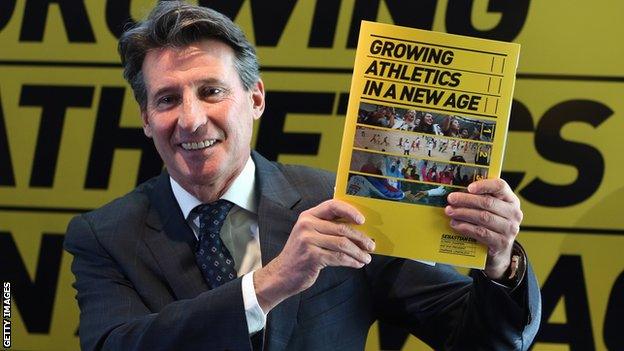
Coe launched his presidential manifesto in London on Wednesday
Lord Coe has launched his manifesto for the election for the presidency of the International Association of Athletics Federations.
He promises a transformation of the athletics calendar, to attract more young people via "street athletics" and to set up an ethics department for the sport.
I spent some time with the former London 2012 mastermind to discuss why he wants the top job in his sport, and what he wants to achieve for athletics.
Lord Coe, first of all if you can, just outline for us why you want this job?
I'm very privileged that track and field has been my life. I joined an athletics club in South Yorkshire in 1968.
It's a journey that took me to two Olympic Stadiums, heading up a team that delivered the largest Olympic sport (athletics) in London, 33 consecutive full houses.
I've woken up most mornings knowing that athletics would shape my life, why wouldn't I want to do this?
It is something that I feel strongly and passionate about. We have a very great sport but we also have some very big challenges.
BBC Sport's 20 most memorable moments from London 2012
Your priorities, what do you think they are?
For me, it's very clear, it's engaging with young people. Every bit of work that we've done, internally and externally, within and outside our sport shows that although we've had many well intentioned initiatives, we have struggled - and we should be open with that - to engage with young people as both competitors, as spectators and ideally at some stage in their lives as coaches.
So it's engaging and exciting and redefining and reviewing the sport.
Why do you think you've struggled?
It's for a variety of reasons really, I think there is no question at all the landscape for young people is much more cluttered and conflicted than it's ever been. I joined an athletics club in 1968, sport was absolutely the central focus in my life and, probably carbon dating myself, there were no other great distractions.
We have to recognise that the landscape that young people are living in and working in and sharing their experiences and their lives in, is very different and we have to adapt to that.
You speak about integrity as one of your pillars in your manifesto and doping is tied very closely to integrity. Do you think that the war on drug cheats is winnable or not?
It has to be. That isn't a "nice-to-have", it a "has to be". Our sport would not have survive three weeks let alone 33 centuries if it had been based on anything else other than hard work, focus, and talented coaching and athletes that were prepared to dedicate half of their young lives on the pursuit of excellences.
It has to be based on that, so this is a war that has to be won.
If it means allocating more resources to it, if it means being tougher in terms of closing the gap between a positive and a sanction, if it means bringing in an independent tribunal to ease the pressure off individual federations, then we have to do this.
It is absolutely about trust. The trust that when an athlete steps foot on track, that the athletes that are lining up against them are there for the right reasons.
The spectators going into the venues know that the event they are watching is real and that parents are encouraging their parents into a sport that has a non-negotiable stance towards drug abuse.
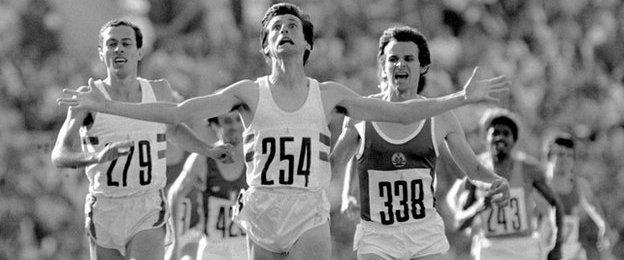
Coe won the 1500m at the Moscow Olympics in 1980
The new World Anti-Doping agency code that is going to introduce a tougher, four year ban for athletes found guilty of cheating, does that go far enough?
That four year ban, let's remember was pushed by track and field. We were very clear that two years is not a sufficient ban, it's a bump in the road.
Would you like more?
I'm uncompromising on this.
Would you criminalise it?
No. I have always preferred a life ban, I recognise that for legal practicalities that train has left the station. It was very important that we won the argument about being able to retain a four year ban.
The Germans are talking about a draft law to criminalise drug cheats, are they on to something here?
It's not only the Germans. If you look at civil law in many other countries, that is actually a criminal offence.
What we have to do is not just clamp down on the athletes, but the entourage that are as often quite insidiously involved in this as the athlete.
You withdrew from the race to be the Chair of the BBC Trust. You said you didn't have the 'capacity' to do it. (Coe is executive chairman of CSM Sport and Entertainment, chair of the British Olympic Association, and a consultant to Chelsea FC and PruHealth, as well as having several unpaid jobs). Do you have the capacity to do this job?
Some of those responsibilities are foundations and charities which I'm very proud of. I think this is a little previous.
This is an election, there is no preordained result, anybody that knows me well enough, particularly over the bidding and the delivery of London knows that I'm absolutely focused.
I would not be committing to this if I were not prepared to be able to do everything that I need to do with all the right corporate governances to deliver that job in the way it needs to be delivered and that's exactly what I did with London.
How tempted were you by the London Mayor position and why did you decide not to go for that and go for this instead?
A glittering athletics career on and off the track |
|---|
Olympics: Gold 1500m 1980 & 1984; silver 800m 1980 |
European Championships: Gold 800m; 1986; silver 1500m 1986 & 800m 1982; bronze 800m 1978 |
World records: 800m (Jul 79-Jul 97); 1500m (Aug 79-Aug 80); mile (Jul 79-Jul 80, 19 Aug-26 Aug 81, 28 Aug 81-Jul 85) |
BBC Sports Personality of the Year 1979 |
Head of bid for 2012 London Olympics; chairman of organising committee for 2012 Games |
I have been aware for some time that there was likely to be a vacancy for this role in August of 2015. I've been involved in this sport for 40 years. Those experiences over those 40 years tell me that this is a wonderful sport. But it now faces some really daunting challenges.
If the sport decides that I am part of their future, I would love to help shape the future of track and field. It's really important that people fall in love with my sport again.
In 2005 in Singapore you said that the London games would "inspire a generation", you were also the government's legacy ambassador following the London Games.
And yet the statistics show that while the number of young people playing sport has risen, the actual proportion of youngsters who are active has declined, and obesity is still on the increase. Have we failed on that part of the legacy, in terms of participation and health of the nation?
No I don't accept that, I don't remotely accept that. Since we bid in 2005 and won the rights to stage the Games, a million and a half more people, and a big chunk of them young people, are now playing sport on a regular basis.
That's actually because the population has increased isn't it?
No that's not actually the case. Never in any era has participation been a gentle uphill graph.
There are challenges, one of the biggest challenges is not about the amount of people playing sport but about the physical inactivity of the population. Sport can play a really important part in that.
If you look at the number of people running, if you look at the number of people involved in my sport, that has increased comfortably in the last few years.
Nobody is sitting there saying that this is going to be anything than a 10 year journey, but the Games were a fantastic opportunity.
Full houses for every track and field competition, the Commonwealth games in Glasgow during the summer, again a fantastic showcase for our country, and then we have the World Athletic Championships in the Olympic Stadium in 2017. I think that's a pretty strong legacy for my sport.
You briefly chaired Fifa's ethics committee for a short time (between 2006-08). Could you have done more to instil a culture of transparency and honesty there that is seemingly lacking when it comes to world football's governing body?
Yes, I was chair of the Fifa ethics committee for about a year and a half and then of course England bid for the 2018 World Cup, and the rest is history. It is very important that sports have ethics committees.
I've been at the centre of structuring an ethics committee within track and field for the very first time. It's very important that we have those corporate governances.
I do make the point more broadly, and this I guess is one of the planks of my election campaign, that all the corporate governances in the world are not going to protect you if the culture of an organisation is not being set pitch-perfectly at the very highest level.
The concept of fair play is not simply rooted in the field of play, and amongst competitors, the tone and style of an organisation is set at the very top, and no matter how wide ranging those corporate governances are, they will never save you unless the culture at the organisation is the right culture.
Can Fifa move forward with president Sepp Blatter in charge?
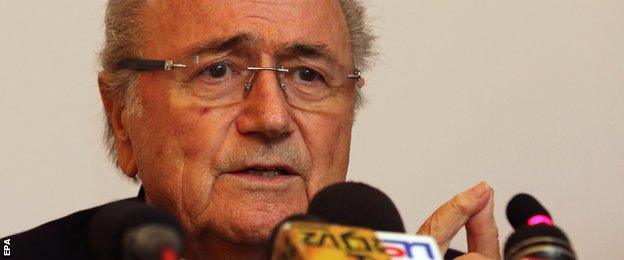
Fifa has come in for heavy criticism for the way it operates under president Sepp Blatter
Fifa has to move forward. Remember organisations from time to time go through those moments, those horrible moments. The IOC went through it in 2000, external with Salt Lake City, we've had it with Ben Johnson and cycling had it.
Sports do, they are very, very resilient and it is very important to remember that for all the mutations that you may have from time-to-time, sport still captures the imagination and for young people it is still a metaphor for life.
So should he go, Sepp Blatter?
That's not for me to say. I'm not involved in football, my sport is track and field, my focus is entirely on track and field. I do not benchmark track and field against what is going on in other sports wherever it takes place.
Just relating to England 2018 and the submission the Sunday Times made to the Commons' Culture, Media and Sport select committee, that said it was on your advice that the England 2018 bid started to spy on rival bids through embassies and private companies. Is that true and did you do the same for the London 2012 bidding process as is claimed by the Sunday Times?
No, I haven't read the report.
The Sunday Times said that "senior England 2018 officials said they were advised to set up a 'network of information' by Lord Coe and fellow executives from the successful London 2012 Olympic bid, who said such an intelligence gathering operation on lobbying activity and voter intentions had been a key part of their own campaign.
The third England 2018 source said Lord Coe had advised the bid that "it would be a good idea to have a source of some information." Did you suggest that?
I think the advice is perfectly sensible advice that you want to know what is going on, it's a campaign. What is being said about your strengths and weakness - intelligence is a very important part of any campaign.
So you did?
I'm saying that absolutely, all organisations that are seeking to campaign for big sporting events need to understand what that landscape looks like.
The World Athletics Championships are going to be held Doha in 2019. You headed up the Evaluation Committee for the IAAF, (that examined Doha's bid). Do you think they get a raw deal when it comes to hosting sporting events?
Many people say it's a controversial decision for them to host the World Cup in 2022 for instance, do you see it that way?
Well again, I'm not benchmarking our sport against any other sport. I chaired the evaluation committee, I spent five exhaustive weeks out on the road with my colleagues, we went through all those bids. They were three extraordinarily high standard bids. (Eugene in the US, and Barcelona were the other two).
We went through the documentation, the bidding process, we did our site visits. Our task was to deliver to my council colleagues a report that allowed them to make a decision about where the World Athletics Championships in 2019 go.
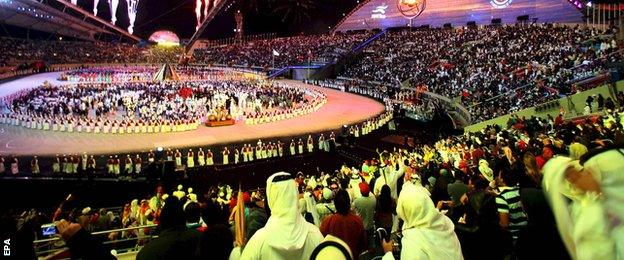
Last month Doha won the right to host the 2019 World Athletics Championships
By a small margin, my council colleagues decided to go to Doha, and Doha will deliver a very good World Championships and it's the responsibility of the IAAF to make sure they are hugely successful.
Do you think it's the precursor to an Olympic bid, and if that happened would you welcome it?
I have no idea. That is of course up to the Qatar national Olympic committee but this is clearly a country that understands sport and wants to play a leading role in sport. The world athletics going to Doha in 2019 is a very clear indication of that.
Shortly before the vote, the Doha bid committed an extra $37m (£23.6m) "incentive" to the 27-strong IAAF Council (to build 10 new tracks around the world).
There is an impression to some that Qatar is effectively "buying" votes, including now with the World Athletics Championships. How do sports bodies balance the need for their money, investing in legacy products, anti-doping, etc, with the challenges - the extreme temperature, the controversy that goes with it?
This was a vote taken on my council, and a council that I'd like to say had a report that was more exhaustive in detail than any other report they've ever had in front of them and it is very important that if we are globalising sport that sport doesn't just simply go to a handful of countries and handful of cities in the mature part of the world.
We want to grow track and field, it is hugely important and that actually sometimes poses you challenge.
But we either sit as a mid-league sport in a handful of countries or we do our very best to take that sport to places where it hasn't been in the past to impact and imprint on young people and yes of course, those are the challenges that go with the presidency and ultimately the management of any senior sport.
- Published27 November 2014
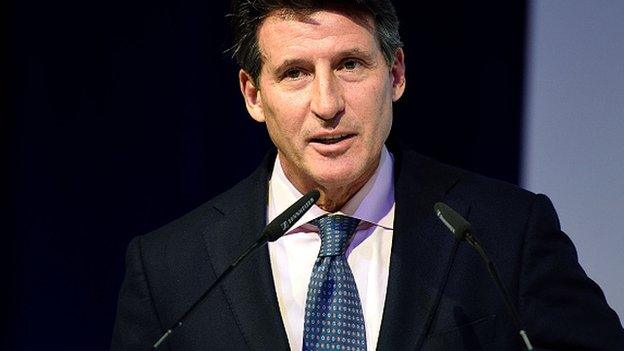
- Published18 November 2014
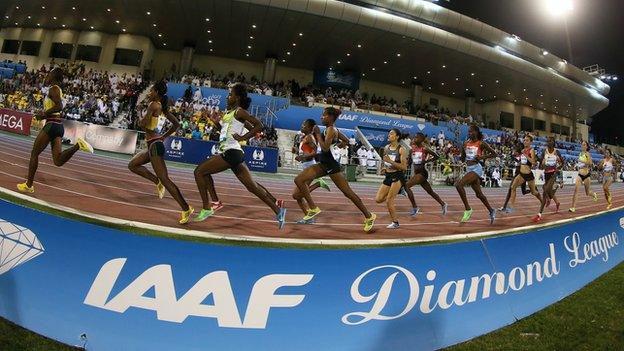
- Published10 September 2015

- Published8 February 2019
